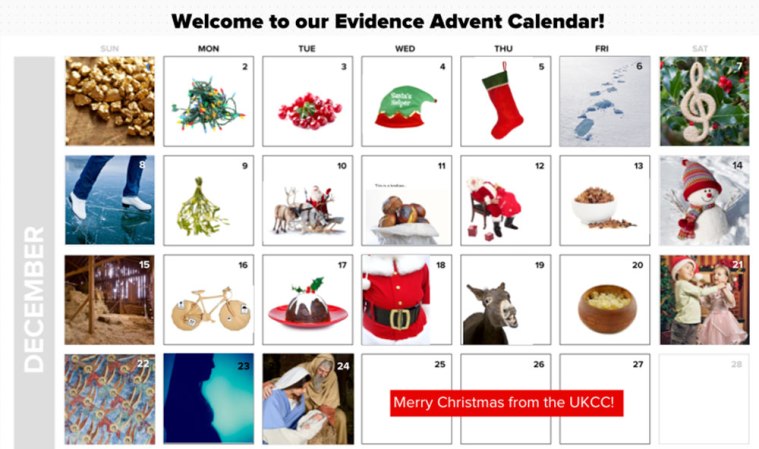Music has the potential to make everything better, doesn’t it? Arguably, this is so in any and all situations. In difficult circumstances, it can help us endure. Music can take the edge off the pain, in both body and mind. No wonder there is a keen interest in exploring its potential to help us in various healthcare settings and this has been the subject of many Cochrane reviews. Continue reading
Tag Archives: Cochrane Heart Group
An evidence advent calendar!
It turns out that Cochrane’s for Christmas, not just for life, with evidence in the Cochrane Library on all manner of festive things from gold, frankincense and myrrh to stockings! Ok, some of the links are a bit tenuous, but we hope you’ll enjoy our advent calendar.
Owing to some trouble with the technology elves, we couldn’t make it interactive (boo!) but each day we’ll post some Cochrane evidence related to the day’s picture, below the calendar. If you think of any others, do share them via the comments box.

A mystery, missing evidence and some answers!
Contrary to what you might expect, you’ll have to wait until the end for the mystery, though in truth missing data and important questions that remain unanswered could also be labelled as that, and this is where I start.
My last blog was a round-up of new and updated reviews on asthma and I begin this one with another offering from the Cochrane Airways Group (do these people never take a day off?). It’s another tale of what we still don’t know, this time about a class of anti-inflammatory drugs called anti-leukotrines. For managing mild persistent asthma in children, low-dose inhaled corticosteroids (ICS) are recommended, but if symptoms aren’t well controlled with ICS then anti-leukotrines may be added. Almost ten years ago, a Cochrane review was published which pulled together the available evidence on the safety and effectiveness of this treatment for adults and children and found very little to go on, with just two small trials with children. Now a review has been published which looked for trials involving children (any age below 18) and finds we’re not much further on.
Getting people to exercise: what do we know about what works?
It’s not news that exercise is good for us, but exercise and health have grabbed the headlines again this week with the publication of new research in the BMJ which, according to the BBC, finds ‘exercise can be as good as pills’. For a nice summary of this research and a reminder that actually the data was patchy and the researchers warn that the findings should be interpreted with caution, read this blog by the Lifestyle Elf. Patchy data notwithstanding, we can agree that exercise is a Good Thing, but how can we get people to do it? Most adults are not active at the recommended level. A team at the Cochrane Heart Group has been busy pulling together the research on whether face-to-face interventions and remote and web 2.0 interventions can help promote physical activity (PA) and how they compare with each other and the results have just been published in three new reviews. Continue reading
Can the Mediterranean diet help us ward off heart disease? The latest evidence
Key message: Limited evidence suggests that a Mediterranean dietary pattern reduces some cardiovascular disease (CVD) risk factors. Existing evidence is promising but more trial evidence is needed to establish the role of the Mediterranean dietary pattern in preventing CVD in the general population and high-risk individuals.
Back in 1970s Britain, I grew up with a Mediterranean diet, thanks to my French step-father, though I didn’t always appreciate it. Strawberry Mivvis for my friends, something (everything?!) in olive oil for me. I particularly hated a concoction called tian, which combined courgettes, eggs and rice to produce something truly unpleasant, particularly when served cold. In 21st century Britain, Marseilles has come to Morrisons and many of us eat Med-style. We hear much conflicting advice about what we should and shouldn’t eat, the benefits of this over that, so I was interested in the latest Cochrane evidence on the so-called Mediterranean diet. Continue reading
What’s being served up in the Cochrane Library?
The reviews are flying into the Cochrane Library quicker than balls off Murray’s racquet this week and several aces have been served! Here’s my pick of the past fortnight.
It’s all strawberries and Pimms in SW19 but in WC1 the good folk of the Cochrane Heart Group are concentrating on garlic sandwiches and tea. Now I like a nice cuppa but a garlic sandwich? Even Jamie Oliver might balk at that, but the suggestion crops up in a new review on preventing cardiovascular disease (CVD) through providing fruit and vegetables to encourage people to eat more of them, or just advising them to do so. I asked heart doctor Harry Boardman to take a look. Continue reading
Screening for abnormal heart rhythms: can we protect more people from stroke?
It’s Action on Stroke Month here in the UK and the Stroke Association hope to raise awareness of stroke and particularly its emotional impact, through the many events taking place during May. They’ve also produced a really helpful guide to making information accessible for people with aphasia, which you can download from the link here. But what can be done to prevent people from having a stroke in the first place? Screening has moved in and out of favour for various conditions in recent years, but something that might be useful is to look for people with abnormal heart rhythms (atrial fibrilliation) that put them at higher risk of stroke and offer them treatment. Continue reading
Do selenium supplements reduce heart attacks?
Probably not, but it could increase your chance of baldness! Selenium is a trace element which is involved with thyroid hormone metabolism, the immune system and also glass making and electronics! It is available to buy as a supplement over the counter, but it is also found naturally in brazil nuts, fish, shellfish and grains. It has become popular in recent years as it has been thought to work as an antioxidant. A new review from the Cochrane Heart Group assessed the effect of this supplement on healthy adults, to test whether it prevented heart attacks. Continue reading
Intervention reduces atrial fibrillation after heart surgery
Atrial fibrillation (AF) is the most common rhythm disturbance of the heart. It involves the top two chambers of the heart quivering (fibrillating) rather than beating effectively. This can lead to three potential problems: Firstly, without the top two chambers pumping properly the heart becomes less effective at pumping. This can make some patients feel tired or more breathless during exercise. Secondly, in some cases, the bottom two chambers of the heart try their best to keep up with the fast quivering of the top two chambers, leading them to beat faster than they normally would. This can make some people feel their heart pounding in their chest (palpitations), or tired or breathless on exertion. Thirdly, patients are more likely to have a stroke. This is because the blood moves more sluggishly through the quivering chambers and has an increased tendency to form blood clots. These can lodge in arteries in the brain, starving that area of blood and oxygen. Continue reading
Statins save lives in patients undiagnosed with heart disease
Given that February is National Heart Month (cue Valentine’s Day), I thought I would blog about a recent Cochrane review by the Cochrane Heart Group which has just been published, all about statins. Statins are a family of medicines prescribed for lowering cholesterol. They are one of the most commonly prescribed medicines, particularly by us cardiologists and our GP colleagues. The number of prescriptions and cost to the NHS of these drugs has grown significantly in the last few years, from £20 million in 1993 to £500 million in 2006. They are frequently prescribed for preventing further heart attacks and strokes when a patient has already had one (called secondary prevention by us doctors) but the evidence of benefit when given to patients to prevent a first heart or stroke (called primary prevention) is less clear. This review aimed to assess the effects, both harms and benefits, of statins in people with no history of cardiovascular disease. Continue reading
